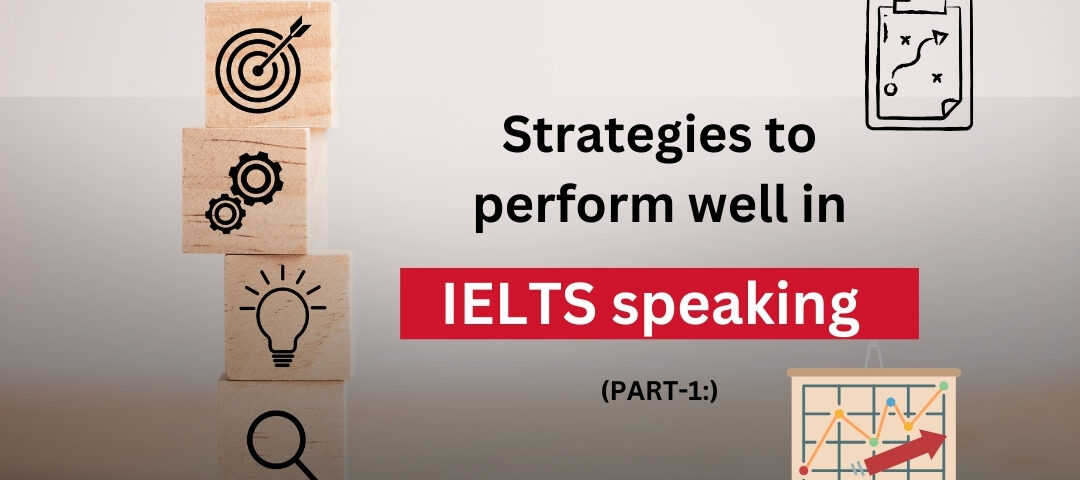
How to Prepare for Duolingo English Test?
14 December 2024
Why to study in Australia?
20 December 2024Strategies to perform well in IELTS speaking PART-1:
The IELTS Speaking test’s first section is frequently referred to as the “easiest” section. This is because you are quite familiar with the subjects covered in part 1. You are questioned about your background, occupation, and self. Inquiries concerning your family, your nation, your experiences, and your hobbies may also be made. You should have no trouble talking about yourself because you are familiar with the terms and subjects.
Let's examine Part 1: Introduction
The examiner introduces themselves and verifies the test taker’s identity before the examination starts. After then, it starts as an interview.
You will be asked the following questions if someone asks you where you live:
Let’s talk about your home town or village:
1.What type of location is it?
2.Which thing of your town or village is the most interesting?
3.What types of occupations are there in your village or town?
4.Is it a nice place to live, in your opinion? (Why?)
Let’s talk about accommodation:
1.Could you tell me about your living accommodation ?
2.You’ve been there for how long?
3.What aspects of living there appeal to you?
4.What kind of living arrangement would you prefer?
Part 1 - Introduction
The best way to start the test confidently, is to be confident!
Follow the steps below to learn what to expect at the start of your speaking test as well as performance tips and suggestions:
1. The examiner calls your name or candidate number.
Smile, say something like, “Yes, that’s me,” and then confidently approach them. Then you can say ‘Hello’ or ‘Hi, how are you?’ to them simply.
2. Sit down at the test table
Inhale, prepare, and don’t forget to smile and seem relaxed. In addition to having their documentation prepared for the examination, the examiner will have turned on the recorder. Put your passport on the table in front of you when the examiner asks to see it.
3. The examiner checks your ID
To make it easier for you to give your passport to the examiner, have it ready at the photo page. As you give it to them, say, “Yes, here you go.”
4. The examiner asks you about what you do or where you live.
Prepare yourself for these easy, well-known questions. Select one of these choices if you work and study, and don’t disclose this to the examiner. Based on your response, the examiner will decide which questions to ask you, so choose wisely by stating that you either work or study. You may reply, “Actually, I don’t study or work, I’m a stay-at-home parent,” if you don’t work or study.
5. Listen to the tense and make sure your answer matches the tense
What do you study? – Present – I’m studying economics at university.
What did you study? – Past – I studied economics while being at university.
What will you study? – Future – I’m looking forward to study economics in the future.
6. Elaborate your answers to give some more information to your answer before the examiner asks ‘why?’.
What do you study? – present – I’m studying economics at an university, because I always aspired to be an economist
What did you study? – Past – I have studied economics while being at university and now, I am preparing for my masters.
What will you study? – Future – I’m aspiring to study economics in the future, as I believe economists play an integral part in bringing the stability in the economy.
7. Prepare for these familiar questions.
Make sure you are able to discuss your work or studies, as well as your past and future plans. Additionally, make sure you are able to discuss your country and place of residence. Use a variety of cohesive methods and connecting words and phrases in your response.
8. Speak clearly at a good pace.
Make sure your mouth is open and your words are pronounced clearly. Avoid talking too rapidly or too slowly. Occasionally smiling while speaking makes your lips slightly wider and improves the clarity of your speech. Don’t forget to use rhythm and intonation. Emphasize key terms or words that create contrast:
“Well, I used to love candy when I was younger, but now that I’m older, I detest it!”
9. If you don’t understand the question, ask for clarification.
“Will you please repeat that?”
“What is meant by _____?”
10. Made a mistake? Don’t panic!
Don’t freak out if you made a mistake! Make every effort to correct yourself as smoothly as you can. You won’t lose many points for a few blunders, so just keep talking if you can’t.

